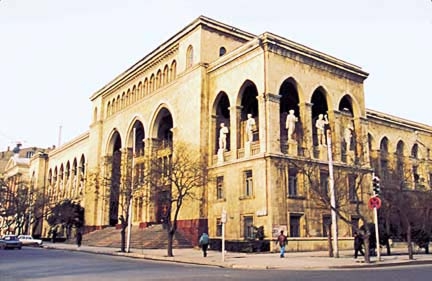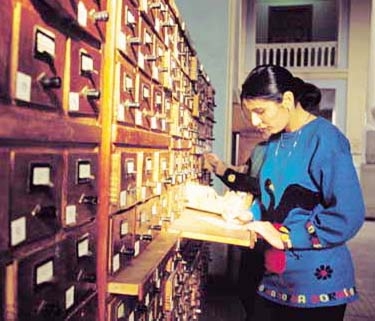|

Spring
2000 (8.1)
Pages
27-28
Leyla Gafurova
Librarian
  I'm the Director of
the National Library in Baku, which holds 4.5 million books;
I've worked here for more than 40 years. So what do you expect
my reaction would be concerning our alphabet change? I'm not
against any particular alphabet, but I am concerned about our
readers. I want them to be able to read everything that our library
contains. But, unfortunately, the books that we are reading today
will be inaccessible to future generations and this worries me. I'm the Director of
the National Library in Baku, which holds 4.5 million books;
I've worked here for more than 40 years. So what do you expect
my reaction would be concerning our alphabet change? I'm not
against any particular alphabet, but I am concerned about our
readers. I want them to be able to read everything that our library
contains. But, unfortunately, the books that we are reading today
will be inaccessible to future generations and this worries me.
Why have we changed our alphabet so often? Why don't you find
other nations changing their alphabets? The alphabet should not
have been changed as it creates so many problems. And what guarantee
do we have that our alphabet won't be changed again in another
50 to 60 years?
Many of our literary scholars can't even read our own beloved
poets Fuzuli and Nizami in the original simply because they don't
know the Arabic script. Sometimes I think it might have been
better for us after we gained our independence in 1991 to go
back to Arabic, instead of Latin. In the past our great thinkers
wrote in Arabic. So why not learn the Arabic script and become
familiar with their works? What about our libraries?
Likewise, many important works were written during the 70 years
that we used the Cyrillic alphabet. Do we just forget everything
that was written during those decades? What a pity that most
readers will not be able to use those books in the future. I'm
concerned that books written in the past will be forgotten.

Photo: Akhundov Library (also
known as the National Library) houses the largest collection
of books in Azerbaijan.
What will happen
to our libraries? There are millions of titles in our catalogs.
What will happen when readers are not even able to read the card
catalogs? The catalogs can't be translated, since the books are
arranged according to the script in which they were published.
How can we write the titles of the books in Latin if they were
originally published in Cyrillic?
Alphabets change, but the contents and substance of books will
always remain. No matter which script was used to publish these
books, they are national treasures for us. We must not cut ourselves
off from this literary and intellectual wealth just because of
alphabet transitions.
It's good that Azerbaijan has not had an abrupt change from Cyrillic
to Latin. It's been a gradual transition. For some time, both
alphabets must exist together so that the new alphabet will be
able to penetrate in a profound way.

Photo: Students peruse the
mostly-Cyrillic script card catalog at the Akhundov Library.
The library is not yet computerized.
On the Streets Around
Us
In the past, street posters, public notices and store names used
to be mostly in Russian. It was an unspoken obligation. But what
do you see today? English and foreign languages! Why should we
give English names to our stores? Let's write in Azeri. Not everybody
knows English. Those who come here from other countries should
learn to read Azeri titles, but instead, it looks like we are
having to learn English. This reflects our attitude toward the
Azeri language. Let foreigners learn Azeri. Let them learn Azeri
to communicate with us. Azerbaijani is a beautiful language.
It's so melodic. So why shouldn't they learn it?
Documentation in
Latin
I'll have to admit that I find it encouraging these days that
we are preparing all of our documents in Azeri. All of our meetings
used to be conducted in Russian despite the fact that sometimes
we couldn't even understand each other.
Now we speak Azeri. We conduct our meetings and sessions in Azeri.
Documentation in the library is done in the Latin script. If
books are published in Latin, they are catalogued in Latin. All
of our invoices and forms are in Azeri Latin, not in Russian
as before.
To me the best thing about Latin is that it is widely accepted
throughout the world, and it gives us tremendous access to Web
sites. Nevertheless, I don't think anything can replace a real
physical book: not the Internet nor any other electronic format.
Books must be held in your hands to be truly appreciated.
These days, I sense a positive attitude developing towards the
Azeri language. We used to speak Russian all the time. Now the
situation has changed considerably. For example, years ago I
enrolled my own kids in the Russian track at school because Russian
was the prestigious language. But now the times have changed.
People like Azeri. They're speaking it at home and we're beginning
to hear it everywhere.
Leyla Gafurova (born 1937) is the Director of the Akhundov
National Library, the largest library in Azerbaijan. Her mother
tongue is Azeri. At home, she mostly speaks Azeri with her family.
She knows Azeri, Russian and some Turkish. She reads and writes
the Latin script well but admits she is faster in Cyrillic. She
followed the Azeri track at Baku State University during her
studies at the Faculty of Library Science.
From Azerbaijan
International
(8.1) Spring 2000.
© Azerbaijan International 2000. All rights reserved.
Back to On the Street: Alphabet
Viewpoints Index
Back to Index AI 8.1 (Spring
2000)
AI Home |
Magazine
Choice
| Topics
| Store
| Contact
us
|



